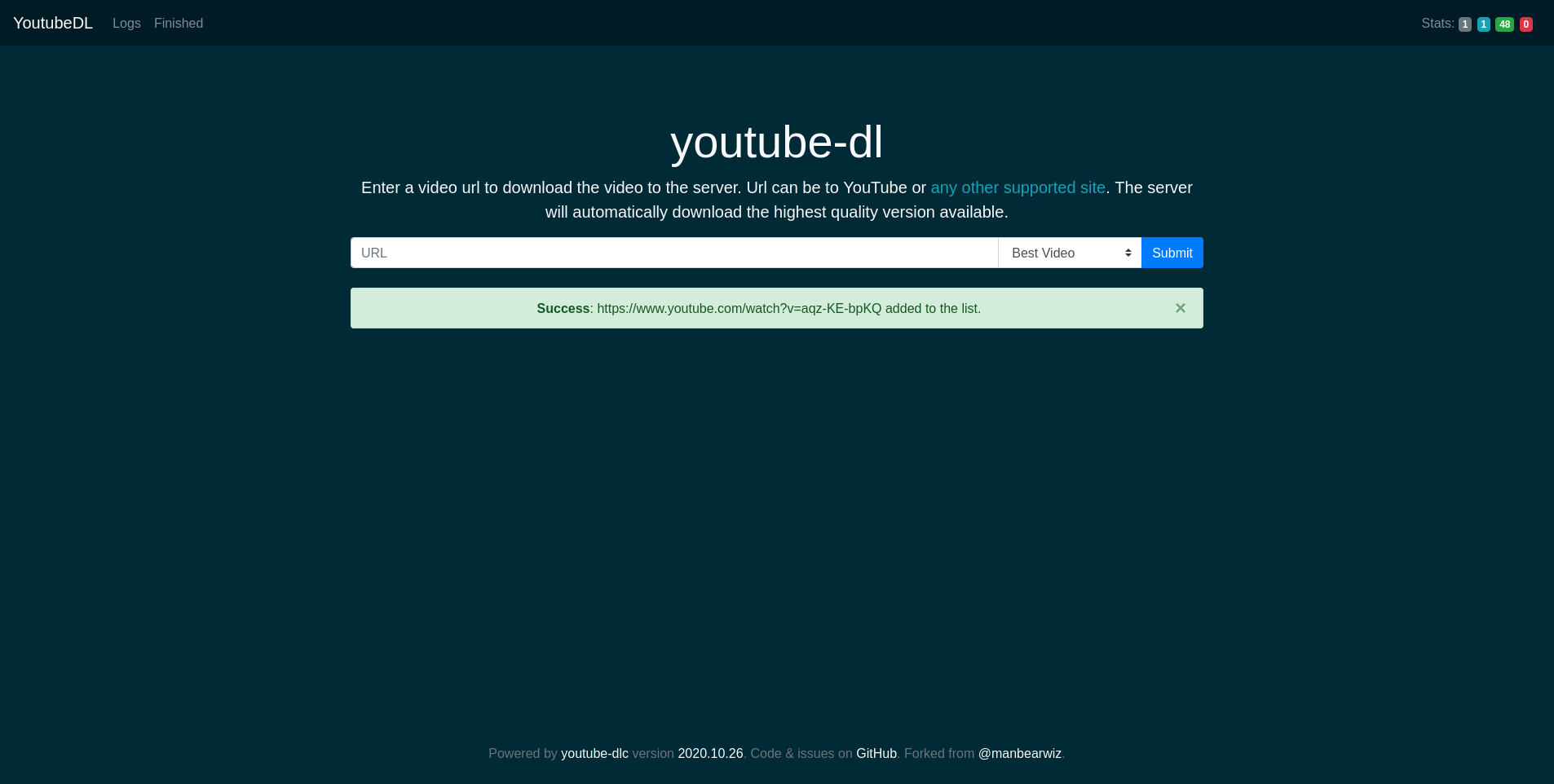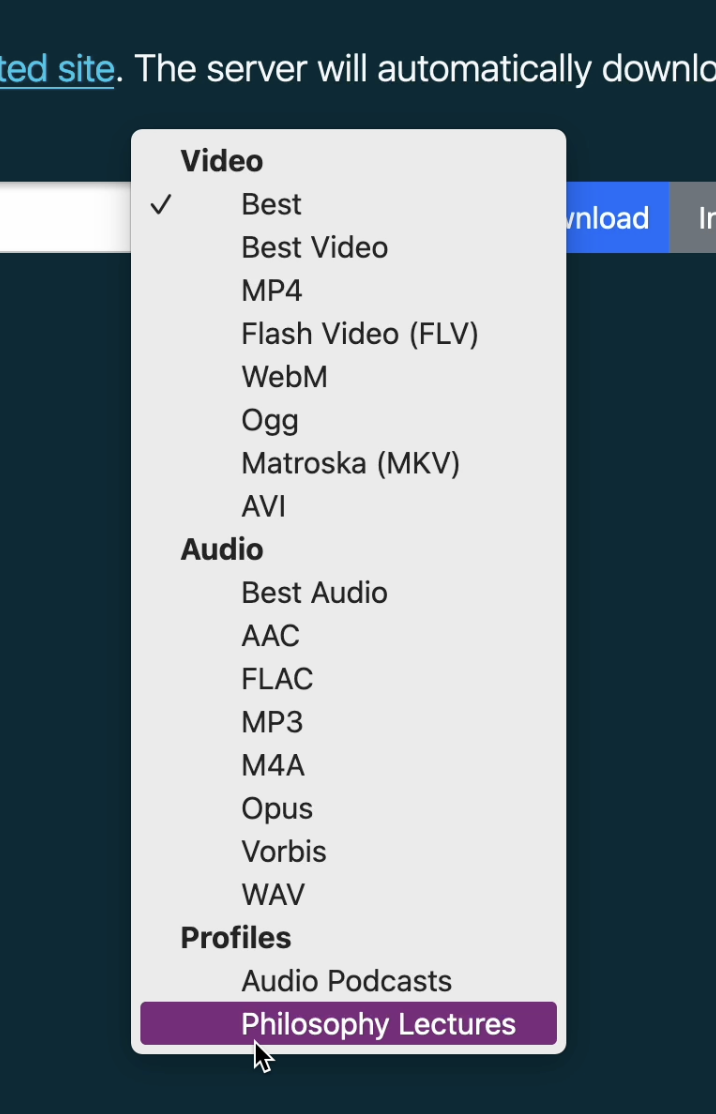Simple Web and REST interface for downloading youtube videos onto a server.
starlette +
youtube-dl / yt-dlp
Forked from manbearwiz/youtube-dl-server.
For easier deployment, a docker image is available on dockerhub:
nbr23/youtube-dl-server:youtube-dlto useyoutube-dlnbr23/youtube-dl-server:yt-dlpto useyt-dlp
This example uses the docker run command to create the container to run the
app. Note the -v argument to specify the volume and its binding on the host.
This directory will be used to output the resulting videos.
docker run -d --name youtube-dl -p 8080:8080 -v $HOME/youtube-dl:/youtube-dl nbr23/youtube-dl-server:latestOR for yt-dlp:
docker run -d --name youtube-dl -p 8080:8080 -v $HOME/youtube-dl:/youtube-dl nbr23/youtube-dl-server:yt-dlpThis is an example service definition that could be put in docker-compose.yml.
youtube-dl:
image: "nbr23/youtube-dl-server:latest"
volumes:
- $HOME/youtube-dl:/youtube-dl
- ./config.yml:/app_config/config.yml:ro # Overwrite the container's config file with your own configuration
restart: alwaysConfiguration is done through the config.yml file at the root of the project.
An alternate configuration path or file path can be forced by setting the environment
variable YDL_CONFIG_PATH:
export YDL_CONFIG_PATH=/var/local/youtube-dl-server/config.ymlIn the above case, if /var/local/youtube-dl-server/config.yml does not exist, it will be created with the default options.
export YDL_CONFIG_PATH=/var/local/youtube-dl-server/In the above case, if /var/local/youtube-dl-server/config.yml does not exist, it will be created with the default options as well.
The configuration file must contain at least the following variables:
ydl_server:
port: 8080
host: 0.0.0.0
metadata_db_path: '/youtube-dl/.ydl-metadata.db'
ydl_options:
output: '/youtube-dl/%(title)s [%(id)s].%(ext)s'
cache-dir: '/youtube-dl/.cache'Additional youtube-dl parameters can be set in the ydl_options sections. To
do this, simply add regular youtube-dl parameters, removing the leading --.
For example, to write subtitles in spanish, the youtube-dl command would be:
youtube-dl --write-sub --sub-lang es URL
Which would translate to the following ydl_options in config.yml:
ydl_options:
output: '/tmp/youtube-dl/%(title)s [%(id)s].%(ext)s'
cache-dir: '/tmp/youtube-dl/.cache'
write-sub: True
sub-lang: esYou can also define profiles. They allow you to define configuration sets that can be selected in the UI.
Sample:
profiles:
podcast:
name: 'Audio Podcasts'
ydl_options:
output: '/youtube-dl/Podcast/%(title)s [%(id)s].%(ext)s'
format: bestaudio/best
write-thumbnail: True
embed-thumbnail: True
add-metadata: True
audio-quality: 0
extract-audio: True
audio-format: mp3
philosophy_lectures:
name: 'Philosophy Lectures'
ydl_options:
output: '/youtube-dl/Lectures/Philosophy/%(title)s [%(id)s].%(ext)s'
write-thumbnail: True
embed-thumbnail: True
add-metadata: True
verbose: TrueIf you have python ^3.3.0 installed in your PATH you can simply run like this, providing optional environment variable overrides inline.
Install the python dependencies from requirements.txt:
pip install -r requirements.txtYou can run bootstrap.sh to download the required front-end libraries (jquery, bootstrap).
python3 -u ./youtube-dl-server.pyTo force a specific youtube-dl version/fork (eg yt-dlp), use the
variable YOUTUBE_DL:
YOUTUBE_DL=yt-dlp python3 -u ./youtube-dl-server.pyDownloads can be triggered by supplying the {{url}} of the requested video
through the Web UI or through the REST interface via curl, etc.
Just navigate to http://{{host}}:8080/ and enter the requested {{url}}.
curl -X POST -H 'Content-Type: application/json' --data-raw '{"url":"{{ URL }}","format":"video/best"}' http://{{host}}:8080/api/downloadsfetch(`http://${host}:8080/api/downloads`, {
method: "POST",
body: new URLSearchParams({
url: url,
format: "bestvideo"
}),
});Add the following bookmarklet to your bookmark bar so you can conviently send the current page url to your youtube-dl-server instance.
If your youtube-dl-server is served through https (behind a reverse proxy handling https for example), you can use the following bookmarklet:
javascript:fetch("https://${host}/api/downloads",{body:JSON.stringify({url:window.location.href,format:"bestvideo"}),method:"POST",headers:{'Content-Type':'application/json'}});If you are hosting it without HTTPS, the previous bookmarklet will likely be blocked by your browser (as it will generate mixed content when used on HTTPS sites).
Instead, you can use the following bookmarklet:
javascript:(function(){document.body.innerHTML += '<form name="ydl_form" method="POST" action="http://${host}/api/downloads"><input name="url" type="url" value="'+window.location.href+'"/></form>';document.ydl_form.submit()})();ffmpeg is required for format conversion and audio extraction in some
scenarios.
- ansible-role-youtubedl-server
- ytdl-k8s -
youtube-dl-serverHelm chart (usesyoutube-dl-serverimage for kubernetes deployment) - starlette
- youtube-dl
- yt-dlp





